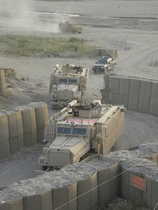 Anyone with vaguest interest in the war we’re fighting in Helmand should tune in next Sunday to Ross Kemp’s Return to Afghanistan. I went to a preview on Friday, and was most impressed.
Anyone with vaguest interest in the war we’re fighting in Helmand should tune in next Sunday to Ross Kemp’s Return to Afghanistan. I went to a preview on Friday, and was most impressed.
We’re told more about the war in Gaza than the one in Afghanistan, and what we do hear from Helmand is normally a staggered narrative of casualties. Kemp’s documentary has something different: it offers a vivid and utterly compelling journey into the lives of the soldiers fighting a fanatical enemy in an environment where the heat can be as deadly as bullets. And Sky has spent the time and money to tell the soldiers’ story.
The power of the documentary lies in its fly-on-the-wall style: different things jump out at you, without the need for commentary. Kemp is ambushed about half an hour after starting out in Helmand, and the camera pretty much tells the rest of the story. You can be struck by the humour (“RPGs have right of way” says a sign on a tent) and the almost unfathomable calm of the soldiers. One lights a cigarette as they’re pinned down in a compound waiting for reinforcements under fire from three directions. Some of the soldiers from Delta Company were also at the preview on Friday and started laughing when they saw themselves react to the bullets whizzing a foot or so above their heads. I asked one of them later how he manages to keep calm. “Easy,” he said. “You lose your cool, you’re dead”. And it’s that kind of quiet heroism that comes across.
While it’s mixed more like a film than a documentary, it’s no Boys’ Own adventure: it interviews the parents of the bereaved, and shows one soldier breaking down when he talks about the death of a friend. Sacrifice and mortality are suffused throughout. It shows Afghan civilians coming in for treatment; there are apparently guts on display in later episodes. All aspects of military life are there. At one point, the Company catch a vomiting bug. As Kemp says ‘people walk past you, then projectile vomit’. It also shows the problems we have with lack of kit. “These are the times you wish you had enough air support” Kemp says to the camera, as they hide in the fields from an ambush.
At the preview on Friday, Kemp said – quite angrily – how the Taliban are very much aware of the UK rules of engagement. So Taliban fighters drop their weapons if they see a helicopter and pretend to be farmers. They can’t be shot. Whenthe chopper disappears, they pick up their guns again and start trying to kill British soldiers.
Kemp works well as a narrator because he has this ineffable everyman quality to him, he doesn’t attempt to come over the hard man. He sees soldiers as the stars, and doesn’t attempt to steal the show but lets them talk (even if Sky subtitle some of the Scots soldiers, the cheeky sods). One private, Nigel Campbell, even praises the Taleban as fighters. “They’re not saying ‘we’ll take these guys on for the sake of a few dollars” he says. “They’re fighting for what they believe in, and you have to respect that.”
Kemp showed his film to MPs last week, and for many of them it will be the best way of understanding the conflict that they debate all too infrequently. There is a dearth of information from Afghanistan, interrupted by the occasional brilliant blasts of reporting from the likes of Tom Newton Dunn and Christina Lamb. But it costs a bomb to send journalists there (the insurance premiums don’t pass Fleet St’s tight purse stings) and going off base is genuinely dangerous. A journalist friend of mine died out there from dehydration, and was brought back to life by a heart message on a helicopter (you can read her story here). Kemp’s cameraman took even more of a risk by lugging this massive HD camera, making him a walking Taliban target. Kemp says the drawback to his film is his inability to get the heat across. Ask a soldier if the environment is more dangerous than the Taliban, he says, and they’ll tell you its 50/50. He also said (at the preview) that “you’re not going to hold the ground there unless you have more troops. And I’m not making that up. I’m listening to people, and passing that on.” But Brown’s commitment, or lack of it, to the campaign is another story.
This is a critical year for Afghanistan, and I suspect public support for the deployment would be a lot larger if more documentaries like this were shown. (It is weird that a commercial station like Sky is the one doing them rather than our so-called public service broadcaster, the BBC). Also at a time when we’re worrying about feckless youth, it’s inspiring to see the courage and professionalism of these teenagers in uniform. (“Some of the guys I went to school with are sitting around doing nothing,” says one 18-year-old private, seemingly pleased that he’s the one who gets to dodge the Talben’s bullets).
Kemp’s film of Delta Company in Helmand shows the very best of the British character. It tells us about the sort of people that all too often we only hear about when they die. Sky had 2m viewers for last series, and this one is better still. It comes with a hearty Coffee House recommendation.







Comments